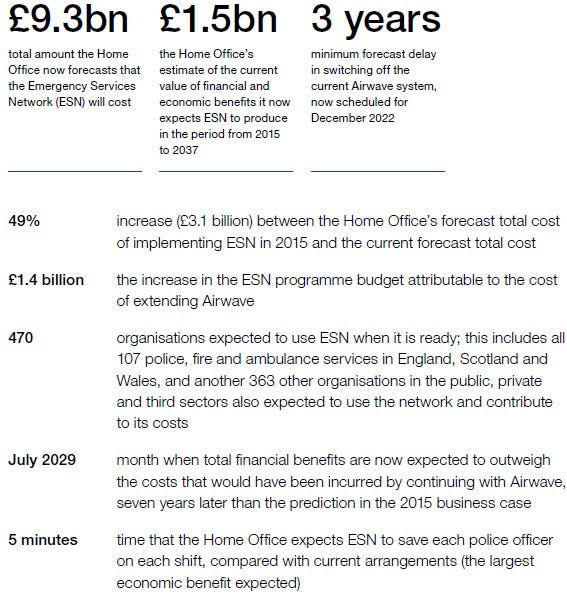The new Emergency Services Network is a predictable mess
The National Audit office has delivered a scathing assessment of the UK’s latest public project failure.
May 10, 2019

The National Audit office has delivered a scathing assessment of the UK’s latest public project failure.
The delayed Emergency Services Network (ESN) is yet another waste of public funds, according to the National Audit Office (NAO). Designed to replace the legacy Airwave system run by Motorola with a new ESN using EE’s 4G network, the whole thing was delayed last year due to reasons and the NAO has just got around to working out what this is costing Joe Public. Here’s the summary table from the NAO report.

“The success of the Emergency Services Network is critical to the day-to-day operations of our emergency services that keep us all safe,” said Amyas Morse, head of the NAO. “The Home Office needs a comprehensive plan with a realistic timetable that properly considers risks and uncertainties. It has already been through one costly reset and is in danger of needing another unless it gets its house in order.”
How likely is that? The NAO seems pessimistic, stating that the revised target date is likely to slip, which would result in even more expenses. The NAO notes that EE seems to have raised its game since it last checked in on the project, but basic bits of technology such as the ability to communicate with aircraft are still not up to scratch. The following statements from the NAO announcement show just how unimpressed it is with how this project is being handled.
“The NAO does not think the Home Office has demonstrated that it understands the challenges emergency services face in introducing ESN, such as incurring extra costs by having to switch,” said the announcement. “Emergency services do not yet know how much money they will need to invest in infrastructure to improve the coverage or to make control rooms compatible. Some worry that this could place further financial pressure on other services they provide.
“There are also a number of commercial risks to ESN. The Home Office is currently renegotiating the programme’s main contracts with Motorola and EE, but these are behind schedule. Motorola needs to be carefully managed as it is both a main supplier to ESN and the owner of Airwave. It could therefore benefit financially from further delays if Airwave is extended. The Home Office is also yet to agree who will be responsible for running the ESN service once it is launched.
“The Home Office does not currently have the capability it needs to integrate and test ESN, which comprises multiple pieces of technology that must be made to work together. The Home Office is planning to let a new contract to provide programme advisory and delivery services in 2019.
“The Home Office expects ESN to be cheaper than Airwave in the long run, but the savings will not outweigh the costs until at least 2029. This is already seven years later than originally intended. The Home Office believes that ESN will bring £1.5 billion in financial and economic benefits by 2037. The largest economic benefit (£643 million) is associated with increases in police productivity. Police representatives told the NAO that they had not agreed these figures with the Home Office.
“The NAO recommends that the Home Office test its overall programme plan to determine whether the new schedule for launching ESN and shutting down Airwave is achievable. The Home Office should also develop a contingency plan that sets out what it will do if the technology it is relying on does not work.”
The sad thing is that this is all entirely predictable and the only time UK public sector technology projects are surprising is when they deliver on time and on budget.
About the Author
You May Also Like










.png?width=300&auto=webp&quality=80&disable=upscale)


_1.jpg?width=300&auto=webp&quality=80&disable=upscale)